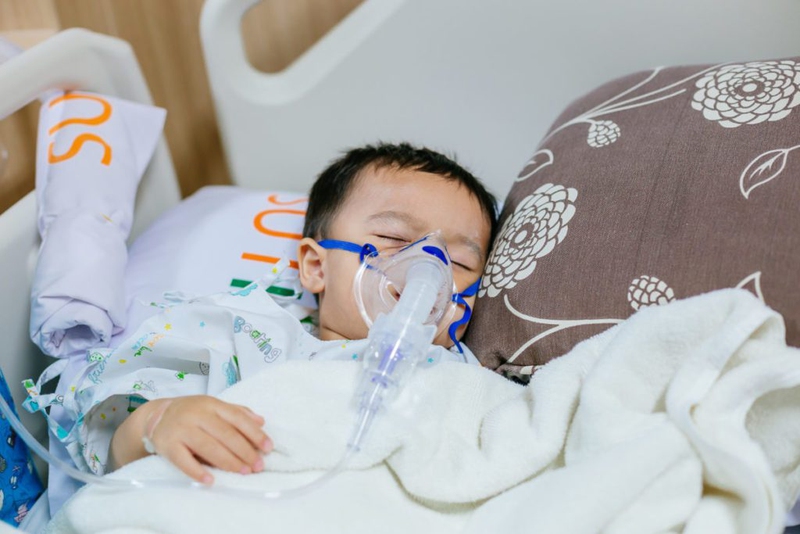RSV or respiratory syncytial virus is a cold-like virus that can infect infants, children, and adults. RSV is more common among younger children under the age of 5 and more so in babies under six months of age. This virus can cause respiratory tract infections and is common during the cold season between November and April. Respiratory syncytial virus in babies can be especially serious and hospitalization may be necessary. To learn more about this condition, continue reading.

What Are the Symptoms of RSV in Babies?
Once an infant has contracted RSV, they tend to show symptoms two days after contracting or symptoms may not be present for up to eight days. The first few symptoms such as runny nose or subtle decrease in appetite may not be noticeable at first. After three days, more serious symptoms can become present. These symptoms include:
Increase in breathing
Trouble breathing
Breathing that appears to be labored
Wheezing
Coughing
Sneezing
Runny nose
Lethargic behavior
When to See a Doctor
Symptoms of RSV can be mild to severe, but in any
Baby does not produce tears when crying or has a sunken soft spot which both indicate dehydration.
Coughing mucus that is discolored, gray, yellow or green.
Nasal congestion that makes it difficult to
breathe .If the infant is under 2 months and has a fever over 110.4 degrees.
If the infant is between 3 to 6 months old and has a fever over 101 degrees.
If the infant is more than 6 months old and has a fever over 103 degrees.
Fingernails or mouth turning blue indicates the baby is not getting enough oxygen and is a severe symptom of RSV.
How to Treat RSV in Babies
For some infants, the symptoms of RSV tend to clear up on their own after a one or two weeks. It is possible to treat RSV at home with your doctor's permission. Doctors can suggest ways to help keep the infants breathing regularly and reduce the amount of mucus they excrete.
Serious cases of RSV will need to be treated at the hospital. Hospital treatments can include the use of oxygen, nasal suctioning and IV for fluids.
Pneumonia may as develop in some children as a result of an RSV infection. While pneumonia can be treated with certain antibiotics, these antibiotics will not be effective at treating the RSV.
How to Make Your Baby with RSV Comfortable
Unfortunately, as with the common cold, RSV has no cure. If your child contracts RSV, then the best thing you can do is to make them as comfortable as possible. Some ways to achieve this include:
Keep your baby well hydrated. You want to supply them with plenty of fluids and, if you are breastfeeding, feed them as soon as they are hungry.
To help loosen the mucus in the nasal passage, drip a little bit of saline solution in the nose. Try to suction out the excess mucus using a bulb syringe.
To help with their breathing, use a cool-mist vaporizer in their room. Be sure to clean the device as directed to avoid spreading additional germs.
RSV in babies less than 3 months old may be able to take acetaminophenfor discomfort. Ask the pediatrician if they recommend this first. Children who are older than 6 months can often be given infant acetaminophen or ibuprofen.
Never use an over the counter medication unless instructed by the doctor. While these may work to relieve some of the symptoms, they can cause the problems to worsen.
How to Prevent RSV in Your Baby
Be sure to wash your hands regularly before touching your child, especially if you have been in an environment where someone has cold symptoms.
Disinfect and clean surfaces you come in contact with daily.
Never let someone touch your child until they have washed their hands.
If you have a cold, you should not kiss your baby.
Try to avoid taking your baby where there will be crowds of people.
You should not allow anyone to smoke around your baby.
The easiest way for RSV in babies to develop is actually getting it from a close family member or relative. So if anyone in your family has cold symptoms, including siblings of the infant and grandparents, they should avoid contact with the baby.
Day cares can be a typical place where children pick up most germs and viruses. If your child does attend a daycare, you should limit the time they need to stay there. This is especially important for children who are more at risk of RSV and during the late fall to early spring months when it is more common to contract RSV.
View All Comments /Add Comment